By Carol Zimmermann
WASHINGTON (CNS) – Catholic leaders, pro-life organizations, Republican members of Congress and several governors are among those on a long list of supporters backing Mississippi’s ban on abortion after 15 weeks of pregnancy and urging the court to reexamine its previous abortion rulings when it takes up this case in the fall.
The U.S. Conference of Catholic Bishops, in its friend-of-the-court brief filed July 27, stressed that abortion is not a right created by the Constitution and called it “inherently different from other types of personal decisions to which this court has accorded constitutional protection.”
Referring to the court’s major abortion decisions – Roe v. Wade, the 1973 court case which legalized abortion, and 1992’s Casey v. Planned Parenthood, which affirmed Roe, – the brief warned that if the Supreme Court “continues to treat abortion as a constitutional issue,” it will face more questions in the future about “what sorts of abortion regulations are permissible.”
Other Catholic groups echoed the USCCB, which was joined in its brief by other religious groups and the two dioceses of Mississippi, in their support of the state’s abortion ban after 15 weeks.
The case, Dobbs v. Jackson Women’s Health Organization, came before the court last year but the justices only agreed in late May to take it up in the next term.
The case focuses on an appeal from Mississippi to keep its ban on abortions after 15 weeks of pregnancy, which was struck down by a federal District Court in Mississippi in 2018 and upheld a year later by the New Orleans-based U.S. Court of Appeals for the 5th Circuit.
A brief filed by O. Carter Snead, law professor at the University of Notre Dame and director of the university’s Center for Ethics and Culture, and Mary Ann Glendon, former U.S. ambassador to the Holy See, said the Mississippi case “offers the cleanest opportunity since Roe v. Wade was decided in 1973 for the court to revisit its deeply flawed and harmful jurisprudence,” or theory of law, on abortion decisions.
They also said the court’s abortion rulings have been “completely untethered from the Constitution’s text, history and tradition” and have imposed “an extreme, incoherent, unworkable and antidemocratic legal regime for abortion on the nation for several decades.”
Similarly, a brief filed by the National Association of Catholic Nurses and the Catholic Medical Association urged the court to take itself out of the “arbitrary line-drawing that Roe and Casey engaged in while attempting to settle the abortion controversy.”
“There is no nonarbitrary line during pregnancy that the court can draw,” the groups added, emphasizing that “the lives of unborn children are on a continuum toward adulthood from conception forward.”
Other Catholic or pro-life groups that filed briefs supporting Mississippi in this case included the Thomas More Society, the National Catholic Bioethics Center, the Diocese of Tyler, Texas, which joined other religious and civil groups, the National Right to Life Committee, Americans United for Life and the March for Life Education and Defense Fund.
The case, which is already getting a lot of attention, will be the court’s first look at the right to an abortion since Justice Amy Coney Barrett’s confirmation to the court last year.
The Mississippi law is being challenged by the state’s only abortion facility, the Jackson Women’s Health Organization.
In announcing they would take up this case, the justices said they would only review one of the three questions presented to them: “Whether all previability prohibitions on elective abortions are unconstitutional.”
In other words, they are focusing on the viability, or when a fetus is said to be able to survive on its own. The Supreme Court has consistently ruled that states cannot restrict abortion before the 24-week mark. The ban on abortions after 15 weeks is more restrictive than current law.
Category Archives: U.S. News
Briefs
Olympic briefs
SCOTCH PLAINS (CNS) – When U.S. runner Sydney McLaughlin crossed the finish line to win the gold in the 400-meter hurdles Aug. 3 in Tokyo, she had the cheers of fans supporting her from the New Jersey Catholic high school where she graduated four years ago. Fans at the watch party at Union Catholic High School in Scotch Plains jumped up and down and cheered for their fellow alumnae who broke her own world record in the event and narrowly beat fellow U.S. teammate Dalilah Muhammad, who was the defending title-winner in this event. Another local watch party was taking place in McLaughlin’s hometown of Dunellen, New Jersey. McLaughlin began her quest to win the gold medal in the event at the Summer Games when she smashed the world record in the 400-meter hurdles at the U.S. Olympic Trials in June. McLaughlin, who turns 22 Aug. 7, stunned the track and field world as a 16-year-old student at Union Catholic when she made the U.S. team for the 2016 Olympics in Rio de Janeiro. On July 27, the last night of the U.S. Olympic Trials at Hayward Field in Eugene, Oregon. She became the first woman to run the 400 hurdles in under 52 seconds – she set a new world record of 51.90.

TOKYO (CNS) – Hidilyn Diaz became the Philippines’ first Olympic gold medal winner, set an Olympic record – and thanked her friends who prayed the Miraculous Medal novena. In a virtual news conference, the 30-year-old said she also prayed the novena and wore the medal. After winning July 26, the four-time Olympian praised God and lifted up Our Lady’s Miraculous Medal from around her neck while repeatedly shouting “Thank You, Lord,” reported the Catholic Bishops’ Conference of the Philippines News. That gesture by Diaz went viral, CBCP News reported. After her win in the women’s 55-kg weightlifting – she had an overall lift of 224 kilograms – more than 493 pounds – she told the virtual news conference about the Miraculous Medal. “It is a sign of … my faith to Mama Mary and Jesus Christ,” she said. In a statement, Archbishop Romulo Valles of Davao congratulated Diaz on behalf of the Philippine bishops. “Her victory was captured through many lenses, and in one of those photos was her holding the gold medal and wearing a Miraculous Medal of Our Lady on her chest. We admire her devotion to the Blessed Mother as she carried in her victory her great faith in God. Hidilyn is a true weightlifter who draws her strength from her love for the country and a deep Catholic faith,” the archbishop said. “Congratulations, Hidilyn! May the Lord continue to bless you with perseverance.”
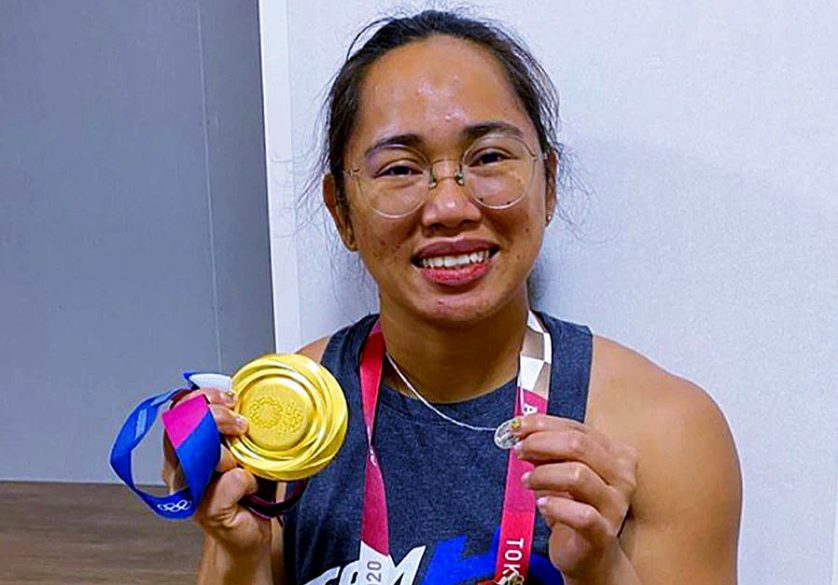
WASHINGTON (CNS) – After a week of historic and electrifying swimming events at the Summer Olympics in Tokyo, two Catholic Olympians will return to their hometown of Bethesda having proudly represented their parish community, their schools and the USA. Katie Ledecky won two gold and two silver medals, and Phoebe Bacon had a strong fifth-place finish in the 200-meter backstroke. Both Olympic athletes attended Little Flower School in Bethesda, in the Washington Archdiocese, and are alumnae of Stone Ridge School of the Sacred Heart, also in Bethesda. Three-time Olympian Ledecky, 24, now a 10-time Olympic medalist, is one of the most decorated female U.S. Olympians ever and also one of the most dominant female swimmers in history. One gold in Tokyo was for coming in first in what was a first: the Olympics inaugural women’s 1,500-meter freestyle swim July 28. Her other gold was her seventh gold in what is her signature event: the 800-meter freestyle race. “What a thrill it has been to watch Katie and Phoebe compete this week. Stone Ridge is incredibly proud of these alumnae athletes, not only for what they accomplish in the sport of swimming, but for the values and character they represent,” said Catherine Ronan Karrels, head of Stone Ridge School. “I am so proud of how they both swam in these Olympic games and how they represented the USA,” she said.

NATION
WASHINGTON (CNS) – As indoor mask mandates are returning in areas of the country hard hit by a new wave of the coronavirus, U.S. bishops have been informing their dioceses of this new policy impacting Masses, Catholic schools and church events. This is particularly true in Louisiana where bishops have been announcing this change in letters to their respective dioceses or public announcements the first week of August. Their announcements followed the Aug. 2 statewide mask mandate issued by Gov. John Bel Edwards requiring anyone age 5 and up to wear a mask indoors in K-12 schools, businesses, universities and churches as the state tries to bring down the rising number of COVID-19 infections. The mandate is in effect until at least Sept. 1. Louisiana is currently experiencing the worst outbreak of new COVID-19 cases per capita in the nation, according to the U.S. Centers for Disease Control and Prevention. It also is having record hospitalizations due to the impact of the Delta variant of the coronavirus particularly affecting the state’s unvaccinated. Despite a recent surge in vaccinations, only 37.2% of its residents were fully vaccinated as of Aug. 4. The state mask mandate also impacts Catholic schools that have already begun opening in some parts of the state.
ST. MICHAEL, Minn (CNS) – It’s doubtful anyone matched Daniel Markham’s driving distance for the 6 p.m. Sunday Mass June 13 at St. Michael in St. Michael. He came all the way from Tinley Park, Illinois, a suburb of Chicago, on a journey that began two days earlier, winding through Wichita, Kansas, and heading north through Iowa to the Twin Cities – all because of a phone conversation with the parish business administrator at St. Michael, Dave Ferry. Five years ago, Markham decided he wanted to attend Mass in all 50 states, plus the District of Columbia and Puerto Rico. After several years of waiting, dreaming, and planning, he got going the weekend of June 5 and 6 when he visited two states on the East Coast, Connecticut and New Hampshire. After coming back to his home in Tinley Park, he went to Wichita for a Mass June 12 and hopped in his car the next morning to drive to St. Michael. The day after Mass there, he went even farther north to visit Extreme Faith Camp near Pine River, about two hours north of the Twin Cities. Markham plans to write a book after finishing all 52 visits, with the last one taking place in July 2022. It will recount his visits not just to parishes but to ministries and organizations that intrigue him.
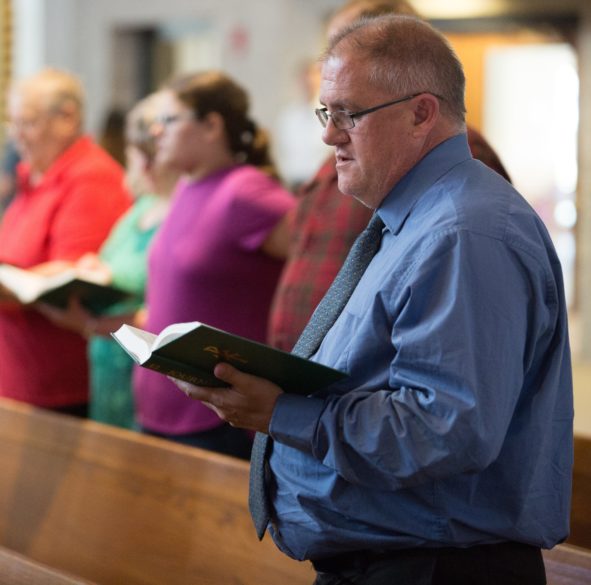
VATICAN
VATICAN CITY (CNS) – Saying he was acting for the good of the unity of the Catholic Church, Pope Francis restored limits on the celebration of the Mass according to the Roman Missal in use before the Second Vatican Council, overturning or severely restricting permissions St. John Paul II and Pope Benedict XVI had given to celebrate the so-called Tridentine-rite Mass. “An opportunity offered by St. John Paul II and, with even greater magnanimity by Benedict XVI, intended to recover the unity of an ecclesial body with diverse liturgical sensibilities, was exploited to widen the gaps, reinforce the divergences and encourage disagreements that injure the church, block her path and expose her to the peril of division,” Pope Francis wrote in a letter to bishops July 16. The text accompanies his apostolic letter “Traditionis Custodes” (Guardians of the Tradition), declaring the liturgical books promulgated after the Second Vatican Council to be “the unique expression of the ‘lex orandi’ (law of worship) of the Roman Rite,” restoring the obligation of priests to have their bishops’ permission to celebrate according to the “extraordinary” or pre-Vatican II Mass and ordering bishops not to establish any new groups or parishes in their dioceses devoted to the old liturgy. Priests currently celebrating Mass according to the old missal must request authorization from their bishop to continue doing so, Pope Francis ordered, and for any priest ordained after the document’s publication July 16, the bishop must consult with the Vatican before granting authorization.
VATICAN CITY (CNS) – Jesus wants to nourish the souls of those who are spiritually famished from the loneliness and anguish that come from life’s difficulties, Pope Francis said. “What does he not want? To be relegated to being considered a side dish – he who is bread – to be overlooked and set aside, or called on only when we need him,” the pope told pilgrims gathered in St. Peter’s Square Aug. 8 during his Sunday Angelus address. The pope reflected on the Sunday Gospel reading from St. John in which Jesus responded to those who doubted that he was the “bread that came down from heaven.” “I am the bread of life. Your ancestors ate the manna in the desert, but they died; this is the bread that comes down from heaven so that one may eat it and not die,” Jesus said. Commenting on the passage, Pope Francis said bread is a basic necessity needed for survival, especially by the hungry who “do not ask for refined and expensive food, they ask for bread.” “Jesus reveals himself as bread, that is, the essential, what is necessary for everyday life; without him nothing works,” the pope said. “He is not one bread among many others, but the bread of life,” he said.
VATICAN CITY (CNS) – Hours before the Taliban took control of Afghanistan’s capital, Kabul, Pope Francis expressed his hope for the peace and safety of the country’s citizens. “I join in the unanimous concern for the situation in Afghanistan. I ask all of you to pray with me to the God of peace, so that the clamor of weapons might cease and solutions can be found at the table of dialogue,” the pope said Aug. 15 during his Angelus address. Only through dialogue, he added, “can the battered population of that country – men, women, elderly and children – return to their own homes, and live in peace and security, in total mutual respect.” The Taliban, an extremist Islamic movement that ruled Afghanistan until ousted by a U.S.-led coalition nearly 20 years ago, began taking over large swaths of the country as U.S. forces withdrew. According to The Associated Press, Taliban fighters entered the presidential palace after Afghan President Ashraf Ghani fled the country.
WORLD
SYDNEY (CNS) – Sydney catechist Caroline Fisher says writing a successful book for Catholic children has helped her spread a message of true love “too good” to keep to herself. The mother of three said her picture book, “Jesus Had a Body Like Me: A Theology of the Body for Babies and Little Ones,” is aimed not just at children but at those who read to them. She is passionate about sharing with readers that each of them is a gift, every soul is sacred and, to truly nourish the body, one must also nourish the spirit within. “God doesn’t make mistakes, and each of us matters to God and has been ‘fearfully and wonderfully’ made in his image and likeness for a purpose only we can fulfill, and nobody else,” Fisher told The Catholic Weekly, newspaper of the Archdiocese of Sydney. “If only people knew this and understood the reasons behind what the Catholic Church tells us what to do and what not to do, we would not see the levels of suicide, despair and hopelessness we are seeing in our society. “Teenagers in particular need to know this, but it’s never too early to connect the dots.” Illustrated by Kama Towcik, the book is based on the theology of the body teachings of St. John Paul II and aims to communicate the message of God’s self-sacrificing love to babies and the very youngest of readers.blessings of the Holy Family. … “We resort to the Holy Family and place under their feet our pain, anxiety, weakness and hopes.”
LES CAYES, Haiti (CNS) – The magnitude 7.2 earthquake that struck Haiti collapsed the bishop’s residence in Les Cayes, killing one priest, leaving one missing and injuring Cardinal Chibly Langlois. Father Emile Beldor died of his injuries after the Aug. 14 quake. Father Jean-Antoine Coulanges is reported missing. Cardinal Langlois sustained arm and leg injuries; church sources say his life is not in danger. Voice of America reported that 18 people, assembled for a baptism, were killed in Immaculate Conception Parish church of Les Anglais. The Haitian civil protection service reported late Aug. 15 that nearly 1,300 people had been killed, more than 5,700 were injured and more than 30,250 families needed shelter. Those numbers were expected to rise as a tropical depression headed toward the island. The civil protection agency warned people to expect strong winds, landslides and flooding in addition to heavy rain and rough seas. At the Vatican Aug. 15, Pope Francis expressed his condolences and closeness to the Haitian people. “While I lift up my prayer to the Lord for the victims, I extend my word of encouragement to the survivors, hoping that the interest of the international community to help might move toward them,” the pope said during his Angelus address.
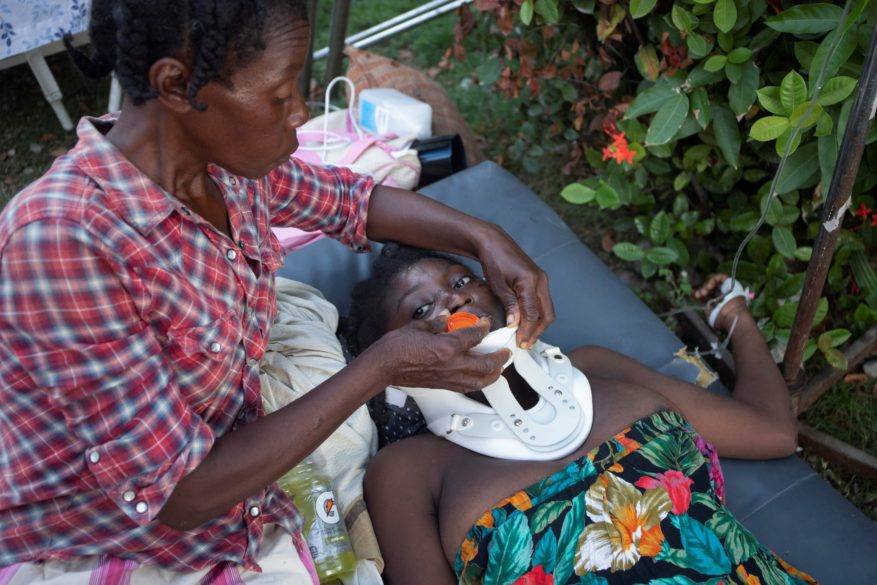
Briefs
NATION
WASHINGTON (CNS) – The Women’s Health Protection Act, introduced in the U.S. Senate and the U.S. House June 8 “would invalidate nearly all existing state limitations on abortion,” said Jennifer Popik, director of federal legislation for National Right to Life. “This legislation would also prohibit states from adopting new protective laws in the future, including various types of laws specifically upheld as constitutionally permissible by the U.S. Supreme Court,” she said in a June 9 statement. The measure was introduced in the Senate by Sens. Richard Blumenthal, D-Conn., and Tammy Baldwin, D-Wis., and in the House by Reps. Judy Chu, D-Calif., Lois Frankel, D-Fla., and Ayanna Pressley, D-Mass. Blumenthal first introduced the measure in 2013 and has reintroduced it off and on over the years. The current measure has 48 Democrats as co-sponsors in the Senate; Sens. Joe Manchin, D-W.Va., and Bob Casey Jr., D-Pa., are not co-sponsoring it. In the House, there are 176 co-sponsors, all of whom are Democrats. Carol Tobias, president of National Right to Life, said the measure “would essentially remove all legal protections for unborn children on the federal and state level. The Women’s Health Protection Act is, in effect, a no-limits-on-abortion-until-birth bill. Tragically, the only ones to benefit from such a law would be abortionists and abortion providers such as Planned Parenthood,” she added.
HOUSTON (CNS) – The founder of the Archdiocese of Galveston-Houston’s program Angela House addressed a national webinar recently about what is needed most to help imprisoned women successfully transition back to their community and families. First is to understand “these are really just human beings and not evil-doers,” said Dominican Sister Maureen O’Connell, a social worker by training who also spent 13 years as a Chicago police officer and chaplain. Speaking during the Catholic Prison Ministries Coalition webinar in May, she explained how other dioceses and community groups can provide similar guidance for the women, 85% of whom have experienced physical and/or sexual abuse in their lives. “It all started for me when I was a volunteer chaplain in Gatesville (women’s prison in Texas) and realized that the women who had been incarcerated two or three times basically needed a safe place to live when they left prison to get away from negative people, places and things,” Sister O’Connell said. Since 2002, she has developed a program of interventions focused on trauma-informed counseling, addiction recovery, employment readiness, and personal and spiritual growth including residential living at Angela House in southeast Houston, free for women recently released from incarceration.
VATICAN
VATICAN CITY (CNS) – Agreeing with German Cardinal Reinhard Marx that Catholic leaders cannot adopt an “ostrich policy” in the face of the clerical sexual abuse crisis, Pope Francis still told the cardinal that he would not accept his resignation as head of the Archdiocese of Munich and Freising. “If you are tempted to think that by confirming your mission and not accepting your resignation, this bishop of Rome – your brother who loves you – does not understand you, think of what Peter felt before the Lord when, in his own way, he presented him with his resignation: ‘Depart from me, for I am a sinner.’ And listen to the answer: ‘Shepherd my sheep,'” the pope wrote to Cardinal Marx. The German cardinal, who is only 67, announced June 4 that he had submitted his resignation to Pope Francis because he believed bishops must begin to accept responsibility for the institutional failures of the church in handling the clerical sexual abuse crisis. Pope Francis wrote a long reply to the cardinal June 10, and the Vatican press office published the letter the same day. “I agree with you in describing as a catastrophe the sad history of sexual abuse and the way the church dealt with it until recently,” the pope wrote. “To realize this hypocrisy in our way of living the faith is a grace; it is a first step that we must take.”
VATICAN CITY (CNS) – Seminarians can learn more from the way their bishops, rectors, spiritual directors and formators live than from what they say, Pope Francis said. Noting the yearlong celebration underway dedicated to St. Joseph, the pope said all those responsible for the formation of new priests – primarily their bishops, but also staff at their seminaries and schools – need to have St. Joseph as their inspiration and model, caring for and protecting priestly vocations. During an audience at the Vatican June 10 with members of the Pontifical Regional Seminary Pius XI of the Marche Region in Ancona, Italy, the pope said that seminarians “can learn more from your life than from your words.” Therefore, he said, “may they learn docility from your obedience; diligence from your dedication; generosity toward the poor from the witness of your sobriety and helpfulness; paternity from your deep and chaste affection.” The pope also urged seminarians to seek out and visit elderly priests, who are “the church’s treasure,” but are often forgotten or isolated in care facilities. They possess wisdom and knowledge that has matured like “fine wine” and can help new ministers in solving their pastoral problems.
High court to hear major abortion case from Mississippi in its next term
WASHINGTON (CNS) – The U.S. Supreme Court said in a May 17 order that it will hear oral arguments during its next term on a 2018 Mississippi abortion law banning most abortions after 15 weeks of pregnancy.
The case is Dobbs v. Jackson Women’s Health Organization. The court’s term opens in October and a decision is expected by June 2022.
Just after then-Mississippi Gov. Phil Bryant signed the law March 19, 2018, a federal judge blocked it temporarily from taking effect after the state’s only abortion clinic filed suit, saying it is unconstitutional. The U.S. Court of Appeals for the Fifth Circuit upheld the block on the law.
In commending Bryant for his signature, the state’s Catholic bishops, Bishop Joseph R. Kopacz of Jackson and Bishop Louis F. Kihneman III of Biloxi, said: “(We) wish to reaffirm the sacredness of human life from conception until natural death. With Pope St. John Paul II, we recognize abortion as ‘a most serious wound inflicted on society and its culture by the very people who ought to be society’s promoters and defenders.’”
In 2020, the Jackson and Biloxi dioceses filed a friend-of-the-court brief in support of Mississippi Attorney General Lynn Fitch’s petition to the Supreme Court asking it to review the 5th Circuit’s ruling prohibiting the state from enforcing the law.
The high court should clarify current law on abortion “in light of a state’s interests in protecting the sanctity of life,” the dioceses’ brief said.
A number of states have passed laws restricting abortion that have been challenged in court by supporters of legal abortion. Pro-life advocates have been hoping one or more of those laws would be taken up by the Supreme Court as a way to challenge 1973’s Roe v. Wade decision legalizing abortion.
The Mississippi case will be the first abortion case the court will consider since the Oct. 26, 2020, confirmation of now-Justice Amy Coney Barrett, President Donald Trump’s third pick for the court. His first two picks, Justices Brett Kavanaugh and Neil Gorsuch, were on the court when it took up its first major abortion decision since they were confirmed.
The case was a Louisiana law requiring abortion providers to have admitting privileges at local hospitals.
The court struck it down as unconstitutional in a 5-4 ruling. Chief Justice John Roberts joined Justices Stephen Breyer, Sonia Sotomayor, Elena Kagan and Ruth Bader Ginsburg in knocking down the law. Kavanaugh and Gorsuch joined Justices Samuel Alito and Clarence Thomas in upholding the law.

The upcoming Mississippi case – it has been on the Supreme Court’s docket as a potential case since last fall – will examine the question of viability, specifically if a fetus can survive on its own at 15 weeks.
Pro-life advocates were pleased with the court’s decision to take this case.
“We applaud the U.S. Supreme Court for examining the Mississippi law,” said Carol Tobias, president of National Right to Life, who stressed that so much more is known now about viability with advanced technology.
Eric Scheidler, executive director of the Pro-Life Action League based in Chicago, said many activists see this as “an opportunity for the high court to overturn Roe v. Wade” or at the very least to “bring abortion policy in the United States in line with rest of the world, where abortion is strictly limited after 12-15 weeks.”
Similarly, Jeanne Mancini, president of March for Life, said the United States “is one of only seven countries – including China and North Korea – that allows abortions through all nine months of pregnancy.”
“An overwhelming majority of Americans agree that this goes way too far,” she said. “In fact 70% think abortion should be limited to – at most – the first three months of pregnancy.”
In a May 17 statement she added: “States should be allowed to craft laws that are in line with both public opinion on this issue as well as basic human compassion, instead of the extreme policy that Roe imposed.”
Thomas Olp, vice president and senior counsel for the Thomas More Society, a nonprofit national public interest law firm, said his firm, on behalf of Illinois Right to Life, has “argued against the now long-outdated science behind Roe v. Wade and urged the court to uphold the subsequent 14th Amendment rights due the preborn.”
Activists were not the only ones to respond in favor of the court taking the case.
Sen. Steve Daines, R-Mont., chair of the new Senate pro-life caucus, tweeted May 17 that he was encouraged the court decided to hear it.
“There is no constitutional right to abortion, yet for nearly 50 years since Roe v. Wade was wrongly decided, more than 62 million children have been the tragic victims of abortion. It is long past time for the Supreme Court to right this wrong,” he said.
O. Carter Snead, law school professor at the University of Notre Dame, said the court agreeing to take this case “signals the possibility that it may finally end its failed and constitutionally unjustified experiment as the nation’s ad hoc abortion regulatory body of last resort.”
He said the court’s “tortured reading of the Constitution has undermined the rule of law, broken our electoral politics and resulted in a staggering number of lives lost. It is time once and for all for the Supreme Court to return to its role as faithful interpreter of the Constitution and to repair the damage it caused years ago.”
CDC director gives nod to indoor worship services for masked, vaccinated
Updated COVID-19 protocols for the Diocese of Jackson
Editor’s note: The following is an abbreviated list of updated COVID-19 protocols from the diocese, as of April 30, 2021.
JACKSON – The Diocese of Jackson acknowledges that the size and demographics of each parish community, as well as the size and layout of church buildings and parish facilities, will shape the way their repective priests and parish leaders decide with prudence and care the way to implement these policies and norms.
For Masses:
• Social distancing will be at 3 feet rather than 6 feet.
• Masks are still required.
• Communion will be received in the hand, not directly in the mouth.
• Hymnals and missalettes may be used in pews.
• Hand sanitizer should still be used by parishioners upon entrance to the church.
• Offertory should be collected using a basket placed in an accessible place, such as a table near the entrance to the church.
• Bulletins can be handed out to parishioners at Mass, but we also encourage our parishes to email bulletins to parishioners using Flocknote.
For meetings, gatherings, parish groups and outside groups, the local community will make the decision as to what it can accommodate in its facilities.
• Awareness of safety protocols needs to be followed when serving meals. Meals should still not be buffet style or self-serve.
• Social distancing should be observed in meetings, a minimum of 3 feet.
• The local community can decide if it is safe and prudent to allow non-parish outside groups to meet in the facilities at this time.
• The local community will decide the sanitizing and cleaning procedures needed at parish facilities.
• At these gatherings, masks should be worn as the norm but the particular situation can be evaluated.
Many parishes will be holding events for youth during the summer, including Vacation Bible School. These things should be kepts in mind:
• Outdoor activities for children and youth will minimize the risk of exposure.
• For trips, a preference should be made for local trips and trips of three hours or less, rather than long-distance trips.
• Service projects are feasible, as long as safety procedures and protocols are kept in mind.
• Meals and snacks should not be self-serve or buffet style. Individually wrapped snacks and food items minimize the safety risk.
We want to thank all of you for your efforts in keeping our parishioners safe during the pandemic. We can modify our protocols and procedures as described above to allow more flexibility, but this is not the time to let our guard down completely. We will get through the summer months with the hope that things will continue to improve. These modified procedures will allow us more flexibility. We will be constatntly monitoring the situation as reality changes.(For a complete list of updated protocols, visit https://jacksondiocese.org/public-health-concerns/. Bishop Joseph Kopacz continues to dispense the faithful from the Sunday obligation to attend Mass. Please stay home if you are feeling unwell or do not feel safe attending Mass. At this time, many parishes are still offering live streaming services.)
By Carol Zimmermann
WASHINGTON (CNS) – When the director of the Centers for Disease Control and Prevention said April 27 that fully vaccinated people who wear masks can safely attend many indoor events such as worship services, the announcement likely did not catch many Catholics by surprise.
That’s because most Catholic parishes nationwide have been having in-person indoor Masses since last summer, although often with limited congregation sizes requiring parishioners to sign up in advance.
The setup of these Masses varies in each diocese and even at different parishes within a diocese. Some parishes are still following strict protocols; others are not requiring masks indoors, and some are offering indoor and outdoor Masses.
Parishes are also following state and county health guidelines that determine how many people may attend indoor services.
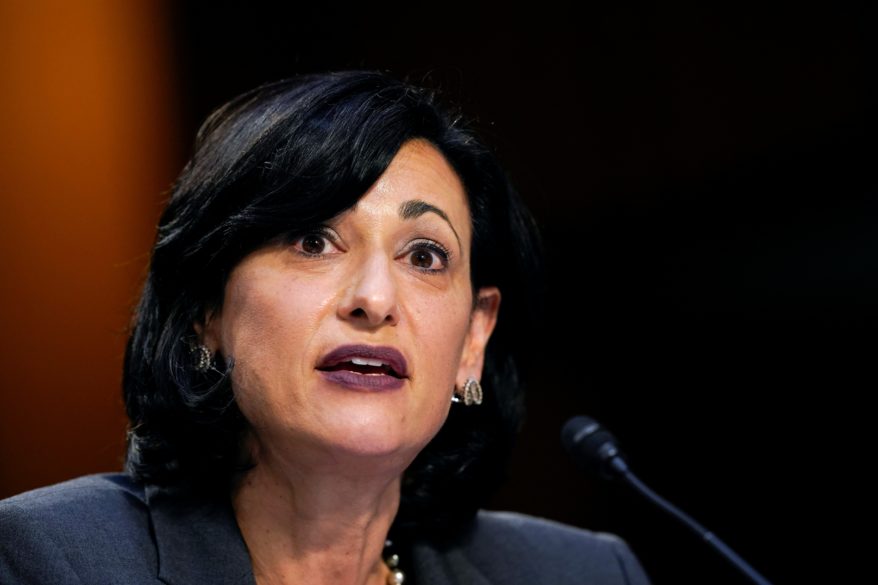
At the beginning of the pandemic, most bishops issued a dispensation from the obligation to attend Sunday Mass, but in recent months a growing number of bishops have lifted that dispensation. Last fall, Bishop David L. Ricken of Green Bay, Wisconsin, lifted the dispensation, then reinstated it two weeks later because of the rising number of COVID-19 cases in the region.
Also, across the country, many parishes that quickly figured out how to livestream their Masses last spring are now continuing to provide this service, even as their congregations are starting to return.
A Catholic News Service reporter’s unofficial Twitter poll April 28 showed a mixed response about what Catholics planned to do for Sunday Mass the weekend after the green light for indoor worship was given – for those who are masked and vaccinated – by Dr. Rochelle Walensky, CDC director.
Most said they would attend Mass in person, and the next largest number of respondents said they had barely stopped going to Sunday Masses in person this past year.
Those who gave specific responses offered a variety of reactions, from saying their parish does a good job with safety protocols to not feeling comfortable going to Mass at their parish, since face masks are not required. One woman said her parish offers indoor, outdoor and livestream Masses and, for now, she would continue attending the outdoor services.
John Kraemer, who attends Christ the Good Shepherd Parish in Saginaw, Michigan, said that as soon as churches reopened, he was “one of the first ones in the door.”
“For someone who has a disability, it was important for me to attend no matter what. So, in that respect, other than when the parishes were closed, I never stopped going. Masked or otherwise,” he said in an email.
A Twitter response from the Hawaii Catholic Herald, archdiocesan newspaper of Honolulu, said: “We’ve been back to in-person attendance for a while now here in Hawaii. Bishop Silva actually lifted the dispensation on attending Mass as of Easter Sunday, so you have to attend unless you have just cause, like a health complication.”
Bishop Larry R. Silva wasn’t the only bishop to lift the Mass dispensation originally made at the height of the COVID-19 pandemic. Dioceses in Texas, South Dakota and Wisconsin began telling Catholics this past fall that they were once again obligated to attend Sunday Mass unless they felt they could not attend because of health reasons or concerns.
The trend continued in February when Detroit Archbishop Allen H. Vigneron announced he was lifting the dispensation for Mass on Sundays and holy days effective March 13. He said he would grant “particular dispensations” to those in need, including those at high risk of COVID-19.
Churches in several states this past year defended their right to worship indoors or with fewer restrictions in court battles that ultimately were resolved by the Supreme Court.
Most recently, a Supreme Court decision in late February allowed indoor worship services in Santa Clara County, California. Earlier that month, the nation’s high court had given California churches the go-ahead to resume indoor worship services with a ban on singing and chanting and a limit of 25% capacity.
“Banning indoor worship and yet allowing people to gather at airports, personal services establishments and retail shopping is unconstitutional – and the Supreme Court has said so several times,” said Bishop Oscar Cantú of San Jose, the diocese in the county where the ban had been in effect.
He said in a statement that he was grateful for the work of these churches in the county and their “efforts to uphold our right to worship” as guaranteed by the U.S. Constitution.
“As we continue to protect the most vulnerable among us, the dispensation from the obligation to attend Sunday Mass is still in effect. Parishes will continue to offer outdoor and livestream Masses wherever possible for parishioners who are vulnerable to COVID-19 or hesitant about indoor worship,” he added.
He also urged the Catholic community to “move forward in hope, continuing all necessary safety precautions” and receiving the COVID-19 vaccine when they could.
(Follow Zimmermann on Twitter: @carolmaczim)
New document offers ways to foster Catholic-Methodist relationships
By Dennis Sadowski
CLEVELAND (CNS) – A two-part publication emerging from the most recent round of dialogue between representatives of the U.S. Catholic bishops and the United Methodist Church offers practical helps and words of inspiration for day-to-day lives.
The work, “Catholics and Methodists Together,” reflects on commonly held beliefs, identifies areas of theological agreement, and provides a guide to shared prayers and worship services.
Published in two parts, the document “is really the spiritual fruit of the pilgrimage of faith that Catholics and Methodists walk on together,” said Father Walter Kedjierski, executive director of the U.S. Conference of Catholic Bishops’ Secretariat of Ecumenical and Interreligious Affairs.
“It’s people of faith coming together and walking together,” Father Kedjierski said.
The document emerged from the eighth round of a dialogue that was established in 1966 between United Methodists and Catholics. The most recent round began in 2015 and concluded in 2020.
Bishop David P. Talley of Memphis, Tennessee, and Bishop Peggy Johnson of the Eastern Pennsylvania Conference of the United Methodist Church co-chaired the dialogue.
Participants included 10 Catholics and eight United Methodists who met twice a year in sessions hosted alternately by each denomination. Each of the earlier rounds of dialogue led to publications that addressed the Eucharist and ecology, common ecclesiology, ethical issues regarding death and dying, spirituality of the ordained ministry, sacramental theology and practice, and rights and responsibilities toward children’s education.
Bishop Johnson told Catholic News Service the new work passes on “the tradition and the goodwill and the understanding” between the two Christian denominations.
“It’s Christian. It’s Jesus. It’s based in God and the Holy Spirit. The things that we disagree about are so much less compared to the things that we agree on,” she said.
The document’s first part, subtitled “We Believe, We Pray, We Act,” underscores the importance of the churches’ shared recognition of each other’s baptism. It includes theological commentaries on the Apostles’ Creed, the Lord’s Prayer, the Ten Commandments and the love of God and neighbor.
Through the exploration of prayer and common beliefs, the document is meant to touch “people within their faith lives and their day-to-day lives,” Father Kedjierski said.
Kimberly Belcher, associate professor theology at the University of Notre Dame, a participant in the dialogue and co-author of the first part, said the document was written largely with people in the pews in mind.
“What we are doing is trying to think about what matters for Catholics, for Methodists in their ordinary lives about ecumenical relationships,” Belcher told CNS.
Belcher said it’s the day-to-day relationships – which she described as ecumenical in nature – that the document is meant to address to help people grow in understanding and appreciation of each other: marriage of a Methodist and Catholic, children of such a marriage, Methodists who teach at Catholic schools and Catholics who teach at Methodists schools and more.
“The ecumenical relationships are much more on the ground more than we realize on a regular basis,” said Belcher, who was invited to join the dialogue as a younger theologian.
Bishop Johnson, the first woman United Methodist bishop to participate in the dialogues said she came to realize through her work the dialogues are important “because there’s so much more to talk about, so much more to share.”
The document’s second part, subtitled “Shared Prayers and Resources,” is a practical guide for Catholics and United Methodists to learn, pray and worship together, Father Kedjierski said.
It details shared traditional prayers, such as the Stations of the Cross, and includes examples of Scripture-center and everyday prayers. It includes templates for ecumenical prayer services for times of crisis, for people in need, including the poor, persecuted and refugees, for Christian unity and for peace.
Bishop Johnson played a major role in developing the second part of the work. She told CNS that throughout her 40 years as an ordained minister, she “fell in love with all the kinds of services we do and the congregations that are part of both bodies.”
“This is just the body of Christ,” Bishop Johnson said.
She also credited the collaboration between Methodist and Catholic humanitarian ministries in response to disasters, hunger, poverty and the needs of prison inmates for helping build bridges that strengthened the dialogues.
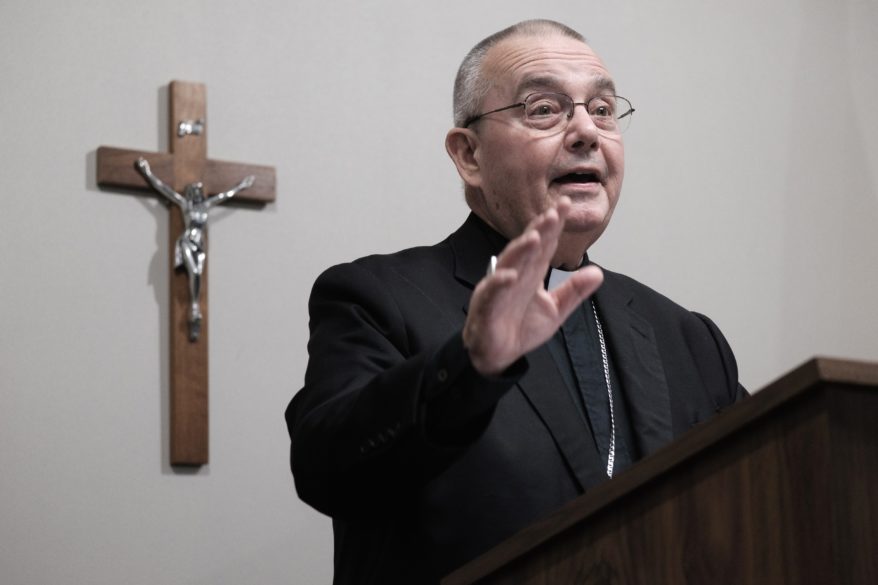
“The bridge keeps going further and further,” she said.
Belcher, the theologian, said the document’s explanation of the common aspects and minor differences found in prayers such as the Apostle’s Creed and the Lord’s prayer between the two faith traditions can become a learning experience for Catholics and Methodists. She suggested that joint study groups can develop among congregations whereby each prayer can be broken down into segments as little as two lines for discussion to help understand the basic foundations of Christian faith.
“We want Catholics vested in the flourishing of Methodists and vice versa,” Belcher said.
The dialogues are expected to continue. Plans are underway for a ninth round, but its future will depend on how the coronavirus pandemic evolves. Bishop Jeffrey M. Monforton of Steubenville, Ohio, and Bishop Kenneth H. Carter Jr. of the Florida Conference of the United Methodist Church will be co-chairs.
In the meantime, the United Methodist Church will be facing a major decision in upcoming years as members around the world are expected to take up a proposal to split the denomination over what it has called “fundamental differences” regarding its beliefs on same-sex marriage and LGBTQ clergy.
Sixteen Methodist leaders from around the world signed a proposal in early 2020 that was to be voted on during the church’s general conference last May. However, the conference was delayed because of the pandemic.
If passed, the proposal would permit a “traditionalist” denomination to separate from the United Methodist Church, the second largest Protestant denomination in the U.S.
The church’s Book of Discipline that outlines its law and doctrine does not allow pastors to perform same-sex marriages and prohibits “practicing” LGBTQ people from becoming ordained pastors. If the new traditionalist denomination is formed, the existing United Methodist Church would be able to repeal the prohibition of same-sex marriages and LGBTQ clergy.
Such an action would result in a major roadblock on the road to future unity between the Catholic Church and United Methodist Church. Catholic doctrine prohibits same-sex marriage and permits sexual relations only between a married man and woman.
If the split occurs, as observers expect, it is unlikely to affect the dialogues, however.
“We remain committed to our relationship with the United Methodist Church and pray for Methodists as they discern these important moral issues while upholding genuinely Catholic positions on them,” Father Kedjierski said.
Bishop Johnson said she expects the dialogues to continue.
“We’ll have to keep talking is all I can say, and we’ll have to talk with each other, and, with the grace of God, to help us through the different conversations,” Bishop Johnson said of the decision facing Methodist leaders.
Regardless of the Methodist outcome, Bishop Johnson said, “I firmly believe that God will make us one in the long run.”
(Follow Sadowski on Twitter: @DennisSadowski)
Tackling racism is difficult work, but it must be done, says Bishop Fabre
By Ruby Thomas
LOUISVILLE, Ky. (CNS) – The work it takes to respond to the issue of racism in the church and the wider community is difficult and slow, but it must be done, said Bishop Shelton J. Fabre of Houma-Thibodaux, Louisiana.
Speaking at the Archdiocese of Louisville’s online Archdiocesan Leadership Institute March 9, Bishop Fabre discussed “witnessing to the dignity of the human person as an antidote to the grave sin of racism.” And he shared six ways to respond to racism.
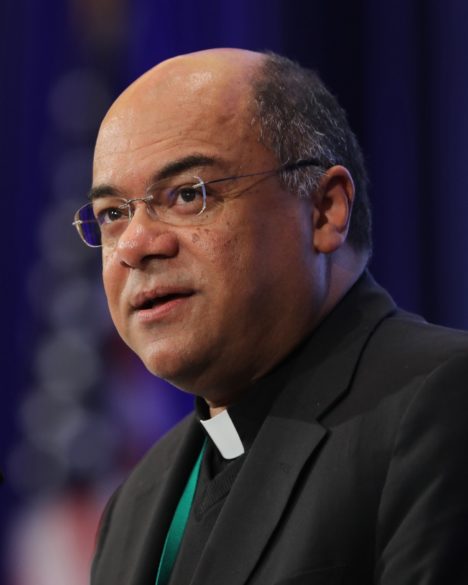
Typically, the institute draws parish leaders, clergy, staff and volunteers together for a daylong gathering of learning and sharing, but this one was presented via Zoom due to the COVID-19 pandemic.
Bishop Fabre spoke to a group of 149 individuals, including Louisville Archbishop Joseph E. Kurtz, archdiocesan chancellor Brian Reynolds, clergy and individuals who serve in various ministries in the archdiocese.
During the first part of the day, Bishop Fabre discussed the U.S. Conference of Catholic Bishops’ 2018 pastoral letter on racism “Open Wide Our Hearts: The Enduring Call to Love.” As chairman of the bishops’ Ad Hoc Committee Against Racism, he played a key role in drafting the letter.
His presentation posed the question: “How can we move forward in responding to issues of racism in the church and our communities?” This work is difficult and may be slow, but doing this work is “our call as a church and our task as disciples of Jesus Christ,” he said.
Racism affects how “we experience the journey through life,” he said.
For some, that journey is one of “optimism, hope and advancement,” he said. For others, it’s one of “fear, dread, injustice and discrimination.”
Bishop Fabre shared six ways to respond to the sin of racism:
– “Recognize and respond to racism as a life issue,” he said.
“Racism attacks the human life and dignity of its victims. … To truly and authentically be pro-life, we must strive to dismantle in our own hearts as well as in society all attacks against the sanctity of life and one such attack is racism.”
– Seek to overcome individualism and encounter others who are racially different.
Racism “traps people into individualism, blaming others for the misfortunes they encounter in life,” said Bishop Fabre. He noted that the 2018 pastoral stated that only by “’forging authentic relationships can we truly see each other as Christ sees us.’” This can only happen, he said, “if we step out of individualism.”
– Accept the growing racial diversity in the nation and the church.
“The church in the U.S. has been enriched by many races and cultures. … We must believe and act upon the fact that there can be unity in our diversity,” said Bishop Fabre. He noted that racism is typically seen as a “Black and white” issue, but noted that in reality racism affects “people of all colors.” “Educating ourselves on the church’s teachings and catechizing the youth and adults must be a way forward,” said the bishop.
– Seek the conversion of one’s own heart.
Bishop Fabre said that while it’s important to work for civil legislation that protects people from racism, “as people of faith we must understand that it is ours to undertake a deeper task,” he said. “Each must examine our own hearts … or what we declare will be empty words.”
– Preach against racism. He urged members of the clergy to regularly preach against racism.
“We all know that preaching against racism will elicit a response, but we must … lead our people to a path of goodness, charity, justice and peace,” said the bishop.
– Pray for an end to racism.
“Rely on the power of prayer. Prayers are often dismissed in these times as having no effect, but authentic prayer keeps us honest about where we are in our fight against racism,” said Bishop Fabre.
In a question-and-answer session that followed his presentation, the bishop was asked to address “the pain and realities of the past year” in which Breonna Taylor and George Floyd, both African Americans, were killed in altercations with white police officers.
“We have to find opportunities as parish communities and as people to really hear stories and to learn and share our thoughts, as well,” the bishop said, adding that Jesus knew the power of stories and used them to teach his followers.
Taylor, 26, was fatally shot in her Louisville apartment March 13, 2020, during a police raid. No officers were charged in her death.
Floyd, 46, died while in police custody May 25, 2020. He was arrested after a store clerk alleged he had passed a counterfeit $20 bill in Minneapolis. He was pinned down by then-Officer Derek Chauvin kneeling on his neck, and he later died after being taken to the hospital.
After Floyd’s death, Bishop Fabre invited parishioners of the Houma-Thibodaux Diocese to speak to someone “racially different” to find out how Floyd’s death made them feel. Those whom he heard from said that in talking to others they finally started understanding the pain.
Asked what will generate “the needed passion” to respond to racism, the bishop that getting people to understand that racism is a life issue is a way to start.
“The more we can get them to see it as that it will hopefully generate a passion and hopefully we will have the same passion to end racism as we have to end all the other attacks against life,” he said, adding it also is important to preach about racism at church and teach about it in schools.
“Placing it before people in positive and constructive ways so that it becomes a part of our conversations” also is needed, he said, “so we can get passionate to see the injustices happening.”
(Thomas is a staff writer at The Record, newspaper of the Archdiocese of Louisville.)
Primeras y duraderas impresiones en el amor
Por Maureen Pratt
Nos conocemos la historia de memoria: una pareja se encuentra, las chispas vuelan y es feliz para siempre. ¿O es eso? Pregunté a cuatro parejas casadas sobre sus primeras impresiones y qué o quién ayudó a que sus matrimonios prosperaran.
Martha González y Chris Fuller, casados por 28 años, se conocieron en el Centro Católico Universitario de UCLA y tomaron la misma clase de estadística. Pero el romance no era obvio para la extrovertida Martha y para el más introvertido Chris.”En todas las clases, me preguntaba: ‘¿Tienes un lápiz extra?'”, dijo Martha. “Eso es todo lo que decía. Estábamos juntos en el coro (del centro católico), nunca me habló. No pensé que le agradaba”. Luego, en un retiro invernal patrocinado por un centro católico, la pareja participó en el clásico “rompehielos”: una pelea de bolas de nieve. El siguiente fin de semana tuvieron su primera cita. El amor y la amistad profunda se basan en la fe compartida.”Siempre hemos marchado juntos en la fe”, dijo Martha. “Y la amistad es una parte integral del matrimonio. Chris es mi esposo, tenemos hijos, también somos mejores amigos”.

Shirley y Sal Bertucci, casados 43 años, se conocían mucho antes de casarse. “Cuando tenía 5 o 6 años”, dijo Shirley, “recuerdo ir al restaurante del abuelo de Sal. Veía a su abuelo abrir ostras”.De adultos, Shirley y Sal asistieron a la misma parroquia cerca de Nueva Orleans, y Shirley enseñó en la misma escuela que la madre de Sal. Pero, a pesar de sus conexiones, el romance necesitaba una pequeña intervención. “Los niños jugaban a casamenteros”, dijo Sal. “Shirley estaba trabajando en el stand de mi madre en la feria, y yo dirigía CYO (Organización de la Juventud Católica). Los niños de CYO dijeron: ‘Tenemos la chica perfecta para ti.” El joven le dijo a Shirley que Sal también era “perfecta” para ella. Más tarde ese día, dijo: “Me reí con Sal, tendremos que hablar sobre la boda más tarde.” La diversión afable llevó a salidas con los jóvenes, familiares y amigos de CYO. Hoy, la familia, la fe, la risa y la comunidad siguen siendo fundamentales para su matrimonio. “Nos reímos mucho,” dijo Shirley. “Contamos nuestras bendiciones,”dijo Sal.
Julie y Marty Hanlon Rubio, casados 28 años, se conocieron en Yale. Las actividades aparentemente ordinarias les ayudaron a comprender las cualidades especiales de cada uno. “Cuando lavamos los platos juntos en la cafetería de nuestra universidad, noté que trabajaba duro en todo, se reía mucho y le encantaba hablar de política y religión.”dijo Marty. ” Me encantó su sentido de la diversión y su ambiente californiano,” dijo Julie. “Además, pude ver que era una buena persona en su esencia. Y amaba a su gran familia.” A pesar de sus ocupadas vidas profesionales, compartir las actividades diarias, como cocinar y cenar juntos, sigue siendo importante, al igual que las videollamadas familiares de los domingos con sus hijos mayores. “Realmente nos ha ayudado a mantenernos cerca,” dijo Julie.
Tom y Becki Racunas, casados 47 años, se conocieron en la universidad.”Cuando Becki entraba al sindicato de estudiantes, noté su sonrisa feliz y la forma en que la gente le respondía,” dijo Tom. Las impresiones de Becki sobre Tom también fueron positivas, ¡casi demasiado! “Cuando mi hermana vino a visitarme a la universidad,” dijo, “la arreglé con Tom porque era el único chico agradable que conocía”. Las buenas cualidades que notaron por primera vez en el otro se han mantenido verdaderas. “A la gente le encanta estar con ella,” dijo Tom. Me encanta eso de ella.” Becki dijo “Tom es mi mejor amigo, y, por supuesto, siempre he pensado que Tom era lindo.”
Atracción, amistad, familia, fe: después de la celebración del Día de San Valentín, el amor real sigue creciendo, ¡una bendición para las parejas que lo alimentan y para nosotros que los conocemos!
Joe Biden y lo que significa ser católico de raza blanca
Por Hosffman Ospino
Joe Biden es el segundo católico elegido como presidente de los Estados Unidos de América. Para ser más exactos, él es el segundo católico de raza blanca que sirve en tal capacidad. ¿Hace alguna diferencia que el presidente Biden sea católico y de raza blanca? Creo que vale la pena explorar la pregunta.
Desde que esta nación se estableció, los católicos hemos luchado intensamente para ser afirmados y reconocidos en medio de olas de sentimiento anticatólico que subsisten en lo más profundo del imaginario social estadounidense.
¿Podemos los católicos ser fieles a la Constitución de los Estados Unidos? ¿Podemos ser parte del contrato social estadounidense? ¿Podemos florecer en una nación de carácter protestante? Con el tiempo, la respuesta a estas preguntas ha sido sí.
Durante los últimos dos siglos, la gran mayoría de esos católicos luchando por ser afirmados y reconocidos, demostrando que tienen méritos para ser ciudadanos de esta nación como cualquier otra persona, han sido de origen europeo. Sus hijos y nietos adoptaron lo que pudiéramos llamar una identidad euroamericana de vivir y actuar, la cual se mantiene hoy en día.
El hacerse euroamericano de alguna manera exigió también hacer suyo el proyecto racial blanco. Tal proyecto como tal es ambiguo. Sin embargo, identificarse como personas racialmente blancas les garantizó a millones de católicos euroamericanos aceptación, voz y privilegios en una sociedad fragmentada por prejuicios raciales.
Identificarse como personas de raza blanca también tiñó por siglos las relaciones entre estos católicos euroamericanos y sus propios hermanos y hermanas católicos considerados como algo diferente a nivel racial.
Los católicos blancos — me refiero primordialmente a católicos euroamericanos, de piel clara y de habla inglesa en general — han obtenido grandes logros como grupo. Cerca del 55% de los católicos en este grupo racial tienen un título universitario o han hecho estudios a este nivel. La mayoría encajan en lo que pudiéramos llamar las clases media y alta en nuestra sociedad.
Por supuesto, no todos los católicos euroamericanos de raza blanca son altamente educados o han logrado sobresalir. Pero millones lo han hecho. La gran mayoría de líderes católicos que son reconocidos por su influencia eclesial y social son euroamericanos de raza blanca. Podemos pensar en obispos, presidentes de universidades, maestros y directores de escuelas católicas, académicos, personas de negocios y, como hemos notado, el actual presidente del país.
El estar de acuerdo o no con las perspectivas políticas del presidente Biden no minimiza el hecho de que él represente de manera particular la promesa y la ambigüedad de la experiencia de los católicos euroamericanos de raza blanca. Algunos lo ven como un campeón de ciertos valores católicos. Otros como la antítesis de los ciertos valores también católicos. Quizás los dos grupos tienen la razón.
La identidad religiosa del presidente Biden, tal como se manifiesta en su vida pública, es en esencia una expresión de lo que significa ser católico euroamericano de raza blanca. Al igual que millones de otros católicos euroamericanos de raza blanca, incluyendo muchos de sus partidarios y sus críticos, el presidente Biden es heredero del pacto que muchos católicos estadounidenses hicieron cuando aceptaron el proyecto sociocultural estadounidense, con sus fortalezas y limitaciones, y sus consecuencias.
Sin embargo, el presidente Biden representa un sector de la población católica estadounidense que está envejeciendo rápidamente y menguando demográficamente. El promedio de edad de los católicos euroamericanos es de 55 años. Cerca de la mitad de los católicos en el país, posiblemente menos, se identifican como personas euroamericanas de raza blanca.
El catolicismo estadounidense refleja, cada vez más las experiencias de comunidades hispanas, negras, asiáticas, indígenas y, todavía, euroamericanas. Nuestra realidad eclesial cambia rápidamente. El futuro del catolicismo estadounidense será más diverso a nivel racial y cultural. El reconocer que cerca del 60% de los católicos menores de 18 años son hispanos ya nos da una idea de ese futuro.
La pregunta que la siguiente generación de católicos estadounidenses nos debemos hacer en el siglo XXI, desde nuestra diversidad, es si tenemos que aceptar los términos del pacto que millones de católicos euroamericanos hicieron en las últimas décadas.
Tenemos la opción de hacer nuestro el proyecto sociocultural estadounidense, con sus fortalezas y limitaciones, con sentido crítico o asumirlo de lleno. Tenemos que decidir si queremos que todo aquello que está asociado con la idea de ser racialmente blanco, con sus dimensiones positivas y negativas, sea parte de nuestra identidad como católicos estadounidenses. Quizás necesitamos un nuevo pacto.
La manera como respondamos intencionalmente a estos dilemas seguramente definirá qué clase de experiencia católica estadounidense encarnará el tercer presidente católico de los Estados Unidos.
(El Dr. Hosffman Ospino es profesor de teología y educación religiosa en Boston College. Ha visitado varias veces el estado de Mississippi para dirigir talleres y ofrecer conferencias sobre inmigración, la familia y el papel de los Hispanos en la Iglesia católica de los Estados Unidos en enero y agosto de 2018.)
Pope establishes World Day of Grandparents and the Elderly
By Junno Arocho
LOS ANGELES (CNS) – Pope Francis announced the establishment of a World Day of Grandparents and the Elderly as a reminder of the important role they play as a link between generations.
During his Sunday Angelus address Jan. 31, the pope said the day will be celebrated every year on the fourth Sunday of July to coincide with the feast of Sts. Joachim and Anne, Jesus’ grandparents. The first celebration of this day will be July 25.
“It is important for grandparents to meet their grandchildren and for grandchildren to meet their grandparents because – as the prophet Joel says – grandparents, before their grandchildren, will dream and have great desires, and young people – taking strength from their grandparents – will go forward and prophesy,” he said.
Highlighting the Feb. 2 feast of the Presentation of the Lord, the pope said the recognition of Christ as the Messiah by the elderly Simeon and Anna is a reminder that “the Holy Spirit still stirs up thoughts and words of wisdom in the elderly today.”
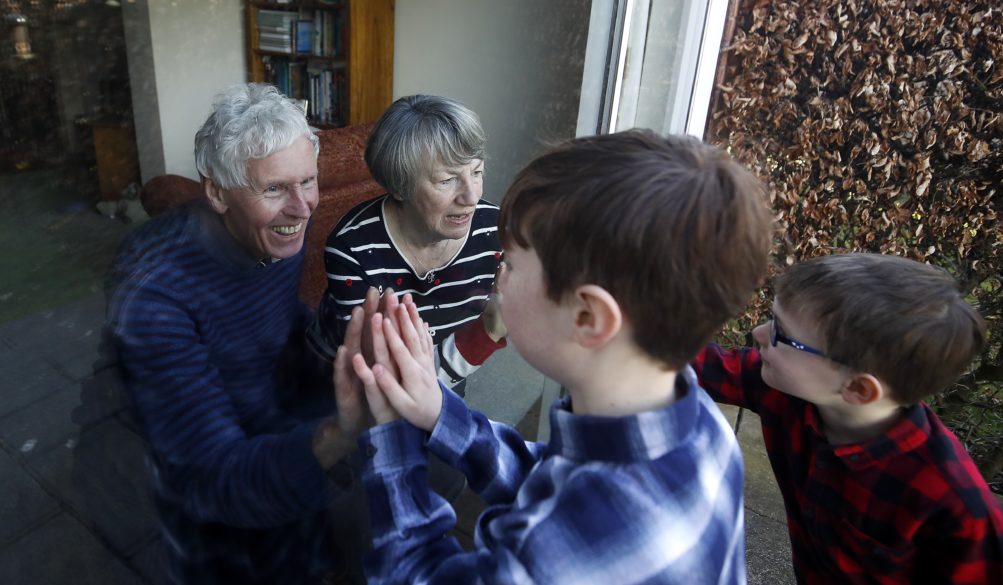
“Their voice is precious because it sings the praises of God and safeguards the roots of peoples,” he said. “They remind us that old age is a gift and that grandparents are the link between generations, passing on the experience of life and faith to the young.”
“Grandparents are often forgotten and we forget this wealth of preserving roots and passing on,” he added.
In a statement published shortly after the pope’s announcement, Cardinal Kevin J. Farrell, prefect of the Dicastery for Laity, the Family and Life, said the yearly event was “a gift to the whole church” that emphasizes the pastoral care of the elderly as “a priority that can no longer be postponed by any Christian community.”
“In the encyclical, ‘Fratelli Tutti,’ the Holy Father reminds us that no one is saved alone. With this in mind, we must treasure the spiritual and human wealth that has been handed down from generation to generation,” he said.
Cardinal Farrell added that “today, more than ever, we are committed to making every effort to dismantle the throwaway culture and to enhance the charisms of grandparents and the elderly.”
The dicastery said Pope Francis will mark the first World Day of Grandparents and the Elderly July 25 with an evening Mass in St. Peter’s Basilica. However, the Mass will be “subject to sanitary regulations in place at the time.”
“Closer to the world day, the Dicastery for Laity, the Family and Life will announce any further initiatives that will mark the event,” the statement said. “As of now, the dicastery is inviting parishes and dioceses around the world to celebrate this world day at the local level in ways that are suited to their pastoral context.”
Follow Arocho on Twitter: @arochoju
